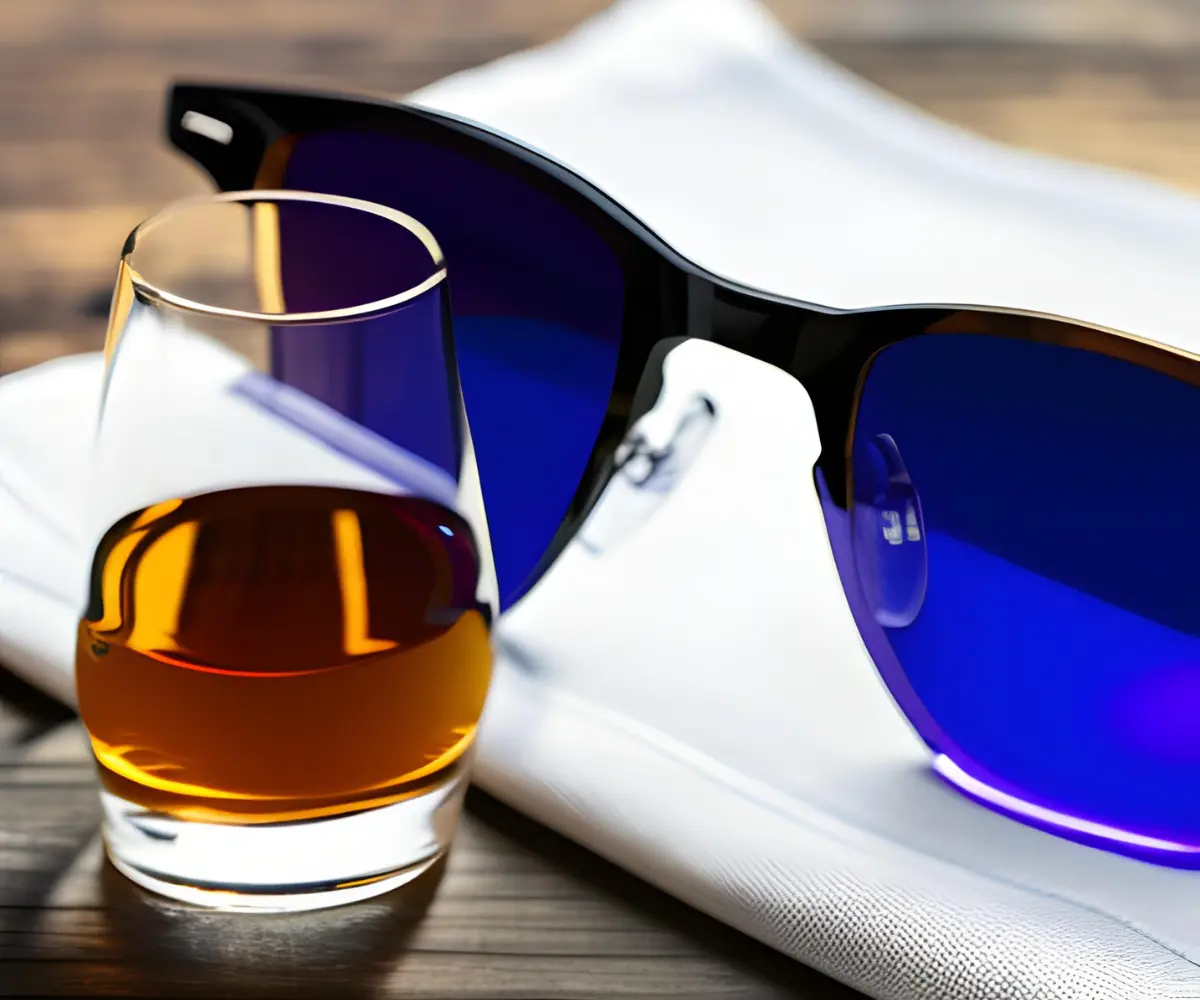Tinted glasses have gained popularity in recent years, thanks to their ability to reduce glare, block harmful UV rays, and provide a more comfortable vision experience. However, cleaning them effectively without causing any damage remains a question for many users. This article will explore whether alcohol can be safely used to clean tinted glasses and provide alternative methods to ensure the longevity of your eyewear.
Understanding Tinted Glasses
Topics Covered In This Article
Tinted glasses are eyewear with lenses that have been treated to reduce the amount of light passing through them. This type of lens is used for various purposes, such as enhancing color contrast, reducing glare, and protecting the eyes from harmful UV radiation. Tinted glasses are available in a wide range of colors, densities, and materials, making them suitable for various activities and individual preferences.
Tinted lenses can be made from glass or plastic materials, and the tint is usually applied by adding a thin layer of dye or coating to the lens surface. This process makes it essential to handle and clean tinted glasses with care to prevent damage or removal of the tint.
The Dangers of Using Alcohol on Tinted Glasses
Using alcohol to clean tinted glasses may seem like a good idea due to its efficacy in removing grease and dirt. However, there are several potential risks associated with using alcohol on your tinted lenses:
1. Damage to the Lens Coating:
Many tinted glasses come with additional coatings, such as anti-reflective, scratch-resistant, or hydrophobic coatings. Alcohol can potentially damage or degrade these coatings, causing them to lose their effectiveness over time.
2. Discoloration:
Alcohol may cause the tint color to fade, especially if the lenses are made from plastic materials. This can affect the appearance of the glasses and reduce their ability to filter light effectively.
3. Lens Cracking:
If your tinted glasses have glass lenses, alcohol can cause micro-cracks to form, especially if the lenses are exposed to rapid temperature changes. These micro-cracks can compromise the integrity of the lens and increase the risk of breakage.
4. Damage to Frame Materials:
Some frame materials, like acetate or other types of plastic, can be adversely affected by alcohol, causing them to become brittle, discolored, or warped.
Alternative Cleaning Methods
Considering the potential risks of using alcohol to clean tinted glasses, it’s crucial to find alternative cleaning methods that are safe and effective. Some alternatives include:
1. Lens Cleaning Solutions:
Many eyewear manufacturers and optical shops offer lens cleaning solutions specifically designed for eyeglasses. These solutions are formulated to remove dirt, grease, and smudges without damaging the lens coatings or tint.
2. Dish Soap and Water:
A mild dish soap diluted with water is a safe and effective way to clean your tinted glasses. Just be sure to rinse thoroughly to avoid leaving any residue on the lenses.
3. Microfiber Cloth:
Using a clean, lint-free microfiber cloth to wipe your lenses is a simple and effective way to keep them clean. The cloth’s fine fibers can remove dirt, fingerprints, and smudges without scratching the lens surface.
How to Clean Tinted Glasses Safely and Effectively
To clean your tinted glasses without causing damage, follow these steps:
- Rinse the glasses with lukewarm water to remove any loose dirt or debris.
- Apply a small amount of mild dish soap to your fingertips and gently rub it onto the lenses, making sure to cover the entire surface.
- Rinse the lenses thoroughly with lukewarm water to remove all soap residue.
- Gently shake the glasses to remove excess water, and then carefully blot the lenses and frames with a clean, soft towel. Avoid rubbing or applying pressure, as this may cause scratches or damage to the tint.
- Use a clean microfiber cloth to gently wipe the lenses, removing any remaining water spots or streaks. Be sure to clean the edges and corners of the frames as well.
- Allow the glasses to air dry completely before wearing or storing them.
Protecting Your Tinted Glasses for the Long Term
Proper care and maintenance are crucial to ensure the longevity of your tinted glasses. Here are some tips to keep your eyewear in top condition:
- Store your glasses in a protective case when not in use to prevent scratches, dust, and other forms of damage.
- Avoid exposing your tinted glasses to extreme temperatures, as this can cause the lens coatings and frame materials to deteriorate.
- Handle your glasses with care, and avoid touching the lenses with your fingers, as this can leave behind oils and smudges.
- Clean your glasses regularly, following the steps outlined above, to maintain their appearance and effectiveness.
- If your glasses become damaged or the tint begins to fade, consult with an optician to determine if the lenses need to be replaced or if the glasses can be repaired.
FAQs
Can I use alcohol-based lens wipes on my tinted glasses?
A: It is not recommended to use alcohol-based lens wipes on tinted glasses. Although these wipes are convenient and effective in cleaning lenses, they can potentially damage the lens coatings, tint, and frame materials. Instead, opt for a mild dish soap and water solution or a dedicated eyeglass lens cleaner to clean your tinted glasses safely and effectively.
How often should I clean my tinted glasses?
A: It’s important to clean your tinted glasses regularly to maintain their appearance and effectiveness. You should clean your glasses whenever they become noticeably dirty or smudged, which could be daily or every few days, depending on your usage and environment. Remember to clean your glasses gently using the steps outlined in the article to avoid damaging the lenses or frames.
Can I use window cleaner on my tinted glasses?
A: Window cleaner is not recommended for use on tinted glasses, as it may contain harsh chemicals that can damage the lens coatings, tint, and frame materials. Instead, use a mild dish soap and water solution or a dedicated eyeglass lens cleaner, both of which are safer and more suitable for cleaning tinted glasses.
Can I clean my tinted glasses with vinegar?
Vinegar is a versatile cleaning agent, but it is not the best option for cleaning tinted glasses. While vinegar can effectively clean glass surfaces, it can be too acidic for the delicate lens coatings and tint on your glasses. This acidity may cause damage, discoloration, or degradation of the coatings. To clean your tinted glasses safely, use a mild dish soap and water solution or a dedicated eyeglass lens cleaner.
How can I remove stubborn stains or smudges from my tinted glasses?
For stubborn stains or smudges on your tinted glasses, it’s essential to avoid using abrasive cleaners or materials that can scratch or damage the lenses. Instead, try gently rubbing the lenses with a clean microfiber cloth, using circular motions. If the stain persists, you can moisten the cloth with a small amount of eyeglass lens cleaner or mild dish soap and water solution before repeating the process. Be sure to rinse the lenses thoroughly with lukewarm water to remove any residue and dry them gently with a soft towel or microfiber cloth.
Can You Clean Tinted Glasses with Alcohol?
While alcohol may be effective in cleaning various surfaces, it’s not recommended for cleaning tinted glasses due to the potential risks it poses to the lens coatings, tint, and frame materials. By using alternative cleaning methods and taking proper care of your eyewear, you can ensure that your tinted glasses remain in excellent condition for years to come.
Also Learn:
How to Remove Tint from Sunglasses
8 Different Ways to Remove Tint from Eyeglasses
How to Remove Tint from Glasses

Robert Perry is a leading expert in the world of eyewear. His wealth of experience and unique insight in the realm of gaming glasses, swimming goggles, sunglasses, eyeglasses, and computer glasses has set him apart in the industry.
A keen observer of daily fashion styles and the utility of glasses in various lifestyles, Perry is passionate about empowering individuals with knowledge on eyewear selection. He is known for his thorough, clear, and relatable analysis, making it easier for readers to find the perfect glasses for their specific needs.
Perry’s writings consistently reflect his understanding of both function and fashion, affirming his position as an influential figure in the eyewear community.

